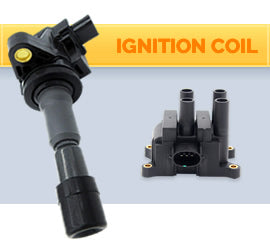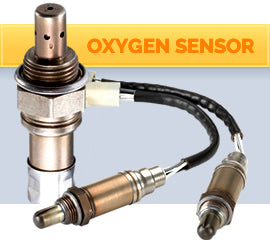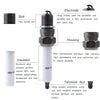Ignition Coils Demystified: Powering the Spark That Drives Your Engine

Ignition coils are a crucial component in a vehicle's ignition system, responsible for converting the low voltage from the battery into the high voltage needed to create a spark at the spark plugs. This spark ignites the air-fuel mixture in the combustion chamber, allowing the engine to generate power.
Here's a brief introduction to ignition coils and how they function:
-
Purpose: The primary function of an ignition coil is to generate a high-voltage spark capable of igniting the air-fuel mixture in the engine's combustion chamber. This process is essential for the engine to run efficiently and produce power.
-
Structure: Ignition coils typically consist of two sets of copper windings (primary and secondary) wrapped around an iron core. The primary winding comprises a few hundred turns of copper wire, while the secondary winding has thousands of turns. This difference in the number of windings enables the ignition coil to step up the voltage from the battery.
-
Operation: When the ignition is turned on, current from the battery flows through the primary winding of the ignition coil, creating a magnetic field around the iron core. When the engine's control module or distributor interrupts the current flow, the magnetic field collapses, inducing a high voltage in the secondary winding. This high voltage (usually between 20,000 to 40,000 volts) is transferred to the spark plug through the ignition wire, where it jumps across the spark plug gap, creating the spark needed for combustion.
-
Types: There are several types of ignition coils, including canister coils, coil-on-plug (COP) coils, coil packs, and distributorless ignition systems (DIS). The specific type of ignition coil used depends on the vehicle's make and model and the design of its ignition system.
-
Maintenance and replacement: Ignition coils are generally durable and long-lasting, but they can wear out or fail over time due to heat, vibration, or internal faults. Symptoms of a failing ignition coil include engine misfires, rough idling, reduced fuel efficiency, and difficulty starting the vehicle. When an ignition coil fails, it should be replaced to ensure optimal engine performance.
In summary, ignition coils play a vital role in generating the high-voltage spark needed for efficient engine operation. Understanding their function, structure, and operation can help you diagnose potential issues and maintain your vehicle's ignition system.
- Posted in Automotive, Autoparts, Ignition Coil












